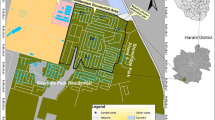Abstract
Water is an ineluctable integral ingredient for the survival of all living beings. During the next century, more than a quarter of the world’s population of developing countries is projected to face extreme water scarcity. This paper shows the drinking water shortage and methods to purify contaminated water in Krishnarampur, a village in West Bengal, India. An ethnographic research approach was used for an in-depth study of problem detection. Dumping of generated waste, and activities like washing clothes, washing utensils, and bathing were deduced as the factors responsible for contamination of the local water sources—lakes, ponds, and rivers. Only certain water resources of the village were found to be clean and fit for use, but not drinkable due to dissolved contaminants. This study discusses technological propositions to improve the quality of pond water for the village community.
Access this chapter
Tax calculation will be finalised at checkout
Purchases are for personal use only
Similar content being viewed by others
References
Solutions to water scarcity: how to prevent water shortages? https://solarimpulse.com/water-scarcity-solutions. Last accessed 21 Feb 2021
Water in crisis—spotlight India. https://thewaterproject.org/water-crisis/water-in-crisis-india. Last accessed 21 Feb 2021
India’s water crisis: the clock is ticking. https://www.downtoearth.org.in/blog/water/india-s-water-crisis-the-clock-is-ticking-65217. Last accessed 21 Feb 2021
Maneesha Vinodini R, Mohan R, Menon S (2016) Live-in-labs: rapid translational research and implementation-based program for rural development in India. In: 2016 IEEE global humanitarian technology conference (GHTC). IEEE, pp 164–171
Zhang D-D, Yan D-H, Fan Lu, Wang Y-C, Feng J (2015) Copula-based risk assessment of drought in Yunnan province, China. Nat Hazards 75(3):2199–2220
Amrita SeRVe—self reliant village. https://amritaserve.org/. Last accessed 07 Mar 2021
2019 Amrita SeRVe the first 5 years. https://amritaserve.org/wp-content/uploads/2019/05/2019. Last accessed 07 Mar 2021
LeCompte MD, Schensul JJ (2010) Designing and conducting ethno-graphic research: an introduction, vol 1. Rowman Altamira
Chambers R (1994) The origins and practice of participatory rural appraisal. World Dev 22(7):953–969
Chambers R (1994) Participatory rural appraisal (PRA): analysis of experience. World Dev 22(9):1253–1268
Keerthana KM, Arjun C, Krishnan JR, Krishna NSH, Mohan R, Valsan V (2020) Technology assisted rural futures in the village of Moti Borvai. In: ICDSMLA 2019. Springer, Singapore, pp 1654–1661
Kadiveti H, Eleshwaram S, Mohan R, Ariprasath S, Nandanan K, Sharma SGD, Siddharth B (2019) Water management through integrated technologies, a sustainable approach for village Pandori, India. In: 2019 IEEE R10 humanitarian technology conference (R10-HTC) (47129). IEEE, pp 180–185
Harith J, Kongeseri S, Menon BM, Sivaprasad JV, Aswathi P, Bhavani RR (2018) Exploring digital tool for participatory rural appraisal. Int J Pure Appl Math 119(12):2787–2810
Chandra G, Katiha PK, Vaas KK, Sharma AP, Bhaumik U (2010) Participatory rural appraisal. Issues and tools for social science research in Inland fisheries. Central Inland Fisheries Research Institute, Barrackpore, Kolkata, India. Bulletin 163:286–302
ISO, BSEN, and BRITISH STANDARD (2010) Ergonomics of human-system interaction
Guleria M, Rajesh T, Panicker AJ, Raja SRR, Soundharajan B, Frey LM, Nandanan K (2020) Using human centered design to improve socio-economic livelihoods with modernized irrigation systems. In: 2020 IEEE 8th R10 humanitarian technology conference (R10-HTC). IEEE, pp 1–6
Lee MJ, Wang Y, Duh HB-L (2012) AR UX design: applying AEIOU to handheld augmented reality browser. In: 2012 IEEE international symposium on mixed and augmented reality-arts, media, and humanities (ISMAR-AMH). IEEE, pp 99–100
Miaskiewicz T, Kozar KA (2011) Personas and user-centered design: how can personas benefit product design processes? Des Stud 32(5):417–430
Carrol JM (1999) Five reasons for scenario-based design. In: Proceedings of the 32nd annual Hawaii international conference on systems sciences. HICSS-32. Abstracts and CD-ROM of full papers. IEEE, p 11
Village/Town-wise Primary Census Abstract (2011) South Twenty Four Parganas District of West Bengal. https://data.gov.in/resources/villagetown-wise-primary-census-abstract-2011-south-twenty-four-parganas-district-west. Last accessed 09 Mar 2021
Amala Bharatam Campaign (ABC)—Amma, Mata Amritanandamayi Devi, https://www.amritapuri.org/activity/nature/abc. Last accessed 10 Mar 2021
Ajith V, Reshma AS, Mohan R, Maneesha Vinodini R, Empowering community in addressing drinking water challenges using participatory sustainable technological systems and business models. In: Technological forecasting and social change (Unpublished)
Jivamritam—Amrita Vishwa Vidyapeetham, https://www.amrita.edu/international/live-in-labs/jivamritam. Last accessed 13 Mar 2021
Azolla (water fern) as protein-rich animal feed-Milkwood, https://www.milkwood.net/2012/08/06/azolla-water-fern-as-protein-rich-animal-feed/. Last accessed 15 Mar 2021
Jerom B, Manimegalai R, Manimegalai R (2020) An IoT based smart water quality monitoring system using cloud. In: 2020 international conference on emerging trends in information technology and engineering (IC-ETITE), Vellore, India
Acknowledgements
This research was funded by Amrita Vishwa Vidyapeetham’s Live-in-Labs® program and the field implementation was funded by the UN-recognized NGO, MA Math. The study was done as part of the UNESCO chair for Experiential Learning for Sustainable Innovation and Development. The authors express their immense gratitude to Sri. Mata—Amritanandamayi Devi, Chancellor of Amrita Vishwa Vidyapeetham, who has inspired them in performing selfless service to society. We would like to express our sincere appreciation to Mr. Gopalaienger Sheshadri for his extensive support in enhancing the quality of the paper within the limited time frame. We would like to express our deepest gratitude to the members of the Krishnarampur community for participating in the study and to those who went out of their way to provide extended support during the study in the village: the government officials of the district of Bishnupur I Block/Tehsil of South Twenty Four Parganas district in West Bengal, and staff of the Amrita Self Reliant Villages (Amrita SeRVe) program.
Author information
Authors and Affiliations
Corresponding author
Editor information
Editors and Affiliations
Rights and permissions
Copyright information
© 2022 The Author(s), under exclusive license to Springer Nature Singapore Pte Ltd.
About this paper
Cite this paper
Yamuna, K. et al. (2022). Addressing Impure Water Quality and Associated Challenges Faced by a Rural Community in West Bengal Through Sustainable Technologies. In: Zhang, YD., Senjyu, T., So-In, C., Joshi, A. (eds) Smart Trends in Computing and Communications. Lecture Notes in Networks and Systems, vol 286. Springer, Singapore. https://doi.org/10.1007/978-981-16-4016-2_32
Download citation
DOI: https://doi.org/10.1007/978-981-16-4016-2_32
Published:
Publisher Name: Springer, Singapore
Print ISBN: 978-981-16-4015-5
Online ISBN: 978-981-16-4016-2
eBook Packages: Intelligent Technologies and RoboticsIntelligent Technologies and Robotics (R0)




